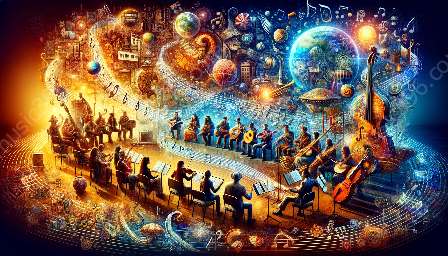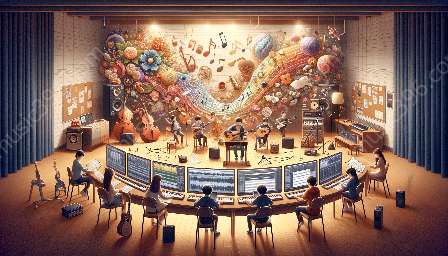Music holds a significant power over social behavior and interactions, affecting individuals and societies in diverse ways. This influence is deeply ingrained in the psychological impact of music and permeates cultural norms and values, creating a rich tapestry of interconnected relationships.
The Psychological Impact of Music
Understanding how music influences social behavior and interactions necessitates delving into its psychological impact. Music has the capacity to evoke strong emotional responses, trigger memories, and shape cognitive processes. It can modulate arousal and mood, affecting an individual's receptivity to social stimuli and interactions. Moreover, music can serve as a form of self-expression and identity construction, impacting an individual's sense of belonging and social connectedness.
Emotional Regulation
Music's effect on emotional regulation is fundamental in shaping social behavior. It can serve as a coping mechanism, influencing individuals' abilities to manage stress and navigate social situations. Certain genres or melodies may induce relaxation, fostering positive interactions, while others may elicit excitement or aggression, impacting the dynamics of social encounters.
Cognitive Processing and Memory
Studies have shown that music can enhance cognitive performance and memory recall. This has implications for social interactions, as shared musical experiences can create strong bonds and facilitate group cohesion. Music's ability to trigger memories can also influence social behavior, evoking nostalgia and fostering feelings of connection and camaraderie.
Identity and Self-Expression
Individuals often use music to express their identities and communicate their values and beliefs. This can influence social interactions by signaling affiliations and fostering a sense of community among like-minded individuals. Music serves as a vehicle for self-disclosure, allowing for the expression of emotions and experiences that further shape social behavior and relationships.
Music and Culture
The influence of music on social behavior extends to the cultural level, playing a pivotal role in shaping societal norms, traditions, and rituals. Music reflects and reinforces cultural identity, acting as a medium through which values, narratives, and collective experiences are transmitted and perpetuated.
Social Cohesion and Unity
Within cultural contexts, music often serves as a unifying force, bringing individuals together through shared participation and engagement. Ritualistic and ceremonial music can reinforce social cohesion and solidarity, promoting a sense of belonging and mutual understanding within a community.
Socialization and Communication
Music is integral to the socialization process, functioning as a form of communication that transcends linguistic barriers. Cultural practices and norms are often conveyed through musical expressions, contributing to the transmission of knowledge, social roles, and behavioral expectations within a society.
Artistic Innovation and Cultural Exchange
Music has the power to foster creativity and innovation within cultural communities, offering a platform for artists to express new ideas and challenge established norms. Furthermore, music has historically facilitated cultural exchange, allowing for the assimilation and integration of diverse influences, thereby enriching social interactions and fostering cross-cultural understanding.
Conclusion
In summary, the influence of music on social behavior and interactions is multi-faceted, encompassing its psychological impact and its role within cultural contexts. Understanding this interconnected relationship is crucial for comprehending how music shapes individual experiences and societal dynamics. By recognizing the transformative power of music, we can appreciate its profound influence on social behavior, cultural norms, and interpersonal relationships.






















